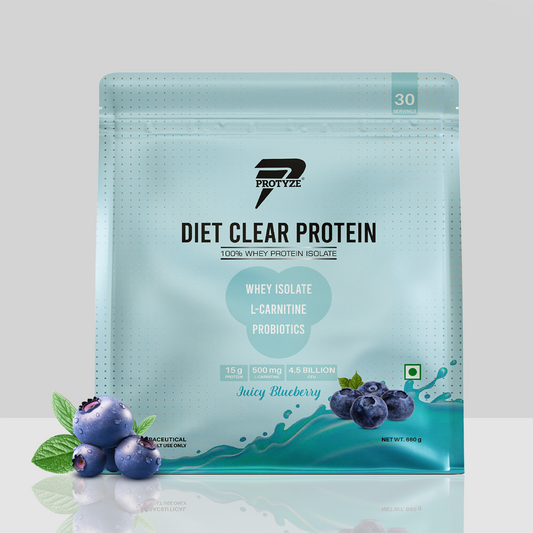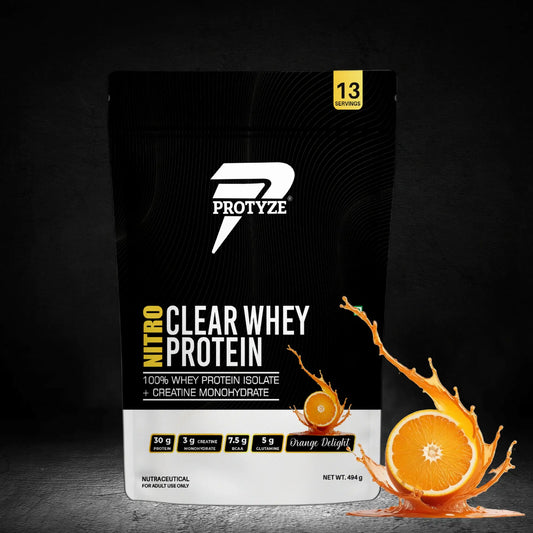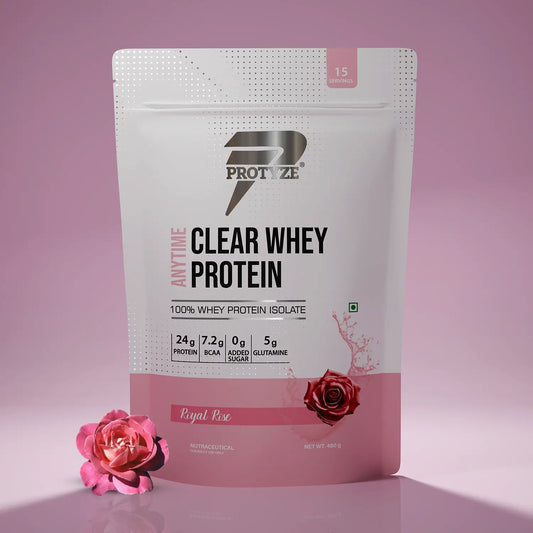Weight loss is a common goal for many, often pursued through diet, exercise, and sometimes supplements. Among these, whey protein has gained attention as a potential ally in shedding pounds, with claims that it can boost metabolism, reduce appetite, and preserve muscle mass during a calorie deficit. But is this just marketing hype, or does science back up the idea that whey protein can help with weight loss?
This Blog explores the science behind whey protein for weight loss, how it works, the evidence supporting its use, potential drawbacks, and practical ways to incorporate it into a weight loss plan. We’ll also highlight Protyze Diet Clear Whey Protein, a low-calorie, probiotic-enhanced option with flavors like Juicy Mango, to show how whey can fit into your goals. Let’s uncover the truth about whey protein and weight loss in 2025.
What Is Whey Protein, and Why Is It Linked to Weight Loss?
Whey protein is a high-quality protein derived from milk during the cheese-making process. It’s rich in essential amino acids, particularly leucine, which plays a key role in muscle protein synthesis. Traditionally consumed as a thick shake, whey protein comes in various forms—concentrate, isolate, and hydrolysate—with clear whey being a newer, lighter variation that’s filtered to remove fats and carbs, resulting in a juice-like drink. Its connection to weight loss stems from several properties:
- High Protein Content: Whey provides 15-30g of protein per serving, making it an efficient way to meet protein needs without excess calories.
- Low-Calorie Options: Clear whey variants, like Protyze Diet Clear Whey Protein with ~60 kcal per serving, offer a leaner profile compared to traditional shakes mixed with milk.
- Digestive Ease: With reduced lactose (often 99% lactose-free), clear whey is gentler on the stomach, appealing to those managing weight through cleaner eating.
- Versatility: It can replace higher-calorie snacks or meals, fitting into a calorie-controlled diet.
These qualities have fueled the idea that whey protein, especially in its clear form, could be a valuable tool for weight loss, but the real question is whether it delivers on these promises.
How Whey Protein Supports Weight Loss
The potential for whey protein to aid weight loss lies in several scientifically supported mechanisms:
- Increases Satiety: Protein is more filling than carbs or fats, helping you feel full longer and reducing overall calorie intake. Studies suggest whey protein, with its high leucine content, may enhance satiety more than other protein sources.
- Boosts Metabolism: Digesting protein requires more energy than digesting other macronutrients, a process known as the thermic effect of food (TEF). This can slightly increase your daily calorie burn, supporting a calorie deficit for weight loss.
- Preserves Lean Muscle Mass: During weight loss, a calorie deficit can lead to muscle loss alongside fat. Whey protein provides amino acids to maintain muscle, ensuring you lose fat rather than muscle, which helps sustain a higher metabolic rate.
- Reduces Appetite: Whey protein may influence hormones like ghrelin (which signals hunger) and GLP-1 (which signals fullness), helping to curb cravings and overeating—common challenges in weight loss journeys.
- Supports Recovery: For those combining exercise with weight loss, whey protein aids muscle repair, allowing you to stay active and burn more calories without excessive fatigue.
- Improves Gut Health: Some whey products, like Protyze Diet Clear Whey Protein, include probiotics, which can enhance digestion and nutrient absorption, potentially supporting a healthier metabolism and weight management.
These mechanisms suggest that whey protein, particularly in a low-calorie, easy-to-digest form like clear whey, could be more than just a fitness fad—it might genuinely contribute to weight loss when used strategically.
The Evidence: Fact or Fiction?
The idea that whey protein helps with weight loss isn’t just anecdotal—there’s growing evidence to support its role:
- Satiety and Calorie Reduction: Research indicates that higher protein intake, including whey, can reduce daily calorie consumption by 10-20% by increasing fullness, making it easier to stick to a weight loss diet.
- Muscle Preservation: Studies show that consuming 20-30g of protein post-workout or with meals helps preserve lean muscle during a calorie deficit, which is critical for long-term weight management.
- Body Composition Improvements: Clinical observations suggest that whey protein, when paired with resistance training, can lead to greater fat loss and less muscle loss compared to a standard diet, enhancing overall body composition.
- Metabolic Boost: Experts note that the thermic effect of protein can increase energy expenditure by 15-30% during digestion, offering a small but cumulative advantage for weight loss over time.
- Appetite Control: Trials have shown that whey protein shakes can reduce hunger more effectively than other protein sources or carbs, supporting better portion control.
However, it’s not a magic bullet. Weight loss ultimately depends on a calorie deficit—burning more calories than you consume—and whey protein alone won’t work without a balanced diet and exercise. Over-reliance on supplements or excessive intake can also lead to weight gain if it pushes you over your calorie limit. The evidence leans toward “fact” when whey protein is used as part of a structured plan, but it’s not a standalone solution.
Clear Whey vs. Traditional Whey for Weight Loss
When it comes to weight loss, the type of whey protein matters. Clear whey, a lighter alternative to traditional whey, offers distinct advantages:
Calorie Content
- Clear Whey: Typically 60-100 kcal per serving (e.g., Protyze Diet Clear Whey Protein at ~72 kcal), especially when mixed with water.
- Traditional Whey: 120-150 kcal or more, particularly when mixed with milk, adding extra calories that can hinder a deficit.
- Verdict: Clear whey is better for calorie control, a cornerstone of weight loss.
Digestive Comfort
- Clear Whey: Often 99% lactose-free, reducing bloating and discomfort, which can support consistency in a weight loss plan.
- Traditional Whey: Higher lactose content (especially in concentrates) can cause digestive issues, potentially disrupting dietary adherence.
- Verdict: Clear whey is gentler, making it easier to use regularly.
Texture and Satiety
- Clear Whey: Light, juice-like consistency may feel less filling but is more refreshing, encouraging frequent use without heaviness.
- Traditional Whey: Thicker texture can enhance satiety but might feel unappealing during weight loss phases focused on lighter eating.
- Verdict: Depends on preference—clear whey suits those prioritizing refreshment, while traditional whey may suit those needing more fullness.
Versatility
- Clear Whey: Can replace snacks or be used in recipes, fitting into a flexible weight loss diet.
- Traditional Whey: Best for shakes or baking, less adaptable as a light option.
- Verdict: Clear whey offers more variety, supporting long-term adherence.
For weight loss, clear whey’s lower calorie profile and digestive ease make it a compelling choice, especially in products designed with weight management in mind, like Protyze Diet Clear Whey Protein.
Potential Drawbacks of Whey Protein for Weight Loss
While whey protein offers benefits, there are considerations to keep in mind:
- Calorie Overload: Consuming too much whey protein, especially with added ingredients or milk, can exceed your calorie needs, leading to weight gain rather than loss. Stick to recommended servings (20-30g) and monitor total intake.
- Digestive Issues: Even low-lactose clear whey might cause discomfort for those with severe dairy allergies, requiring a switch to plant-based alternatives.
- Not a Magic Solution: Without a calorie deficit and exercise, whey protein won’t lead to weight loss. It’s a tool, not a cure-all, and must be paired with lifestyle changes.
- Cost: High-quality whey, particularly clear varieties, can be more expensive than whole food protein sources like eggs or chicken, which might not fit every budget.
- Overemphasis on Protein: Relying solely on protein without balancing carbs and fats can lead to nutrient imbalances, affecting energy and overall health during weight loss.
Awareness of these drawbacks ensures whey protein is used effectively as part of a broader weight loss strategy.
Conclusion
The question of whether whey protein helps with weight loss leans heavily toward “fact” when used correctly. Its ability to increase satiety, boost metabolism, preserve muscle mass, and support recovery makes it a valuable tool in a weight loss plan, particularly in a low-calorie form like clear whey. While it’s not a miracle cure and requires a calorie deficit and exercise to work, the evidence supports its role as part of a balanced approach. Protyze Diet Clear Whey Protein, with its 15g protein, ~70 kcal, probiotic-enhanced, 99% lactose-free formula, and refreshing flavors like Juicy Mango and Juicy Blueberry, is an excellent choice for those looking to shed pounds while supporting overall health. By integrating whey protein into a structured routine with proper nutrition and activity, you can turn the fiction of quick fixes into the fact of sustainable weight loss in 2025.





